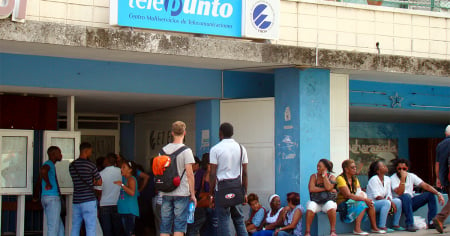Following ETECSA's recent decision to dollarize a portion of its primary mobile Internet services and severely limit access using national currency, some Cubans, both inside and outside the island, have chosen to outright reject any recharges from abroad.
This is reflected in a viral video posted this Sunday on Facebook by the user Ezequiel Puldon, with the message “The pure one jumped in a dive!”
In the video, a visibly indignant Cuban father is heard reacting to the cost of an international recharge.
"Now I saw 9 gigs for 22 dollars," she exclaims incredulously, referring to the new rates imposed by ETECSA.
Without holding back frustration, he makes a decisive remark: “Look, throw away the phone, sell it with the line and everything, because I'm not recharging that crap anymore. We'll talk when we see each other over there, or you can send me a letter and I’ll send you one back. Finish.”
Its outbreak summarizes the feelings of frustration of thousands of Cubans in response to the abuses of the state telecommunications company.
The citizen rejection of the international top-ups imposed by ETECSA has gained momentum on social media, where many Cubans describe these offers as exploitative and disconnected from the country's economic reality.
From expressions of dignity such as "we don't want remittances from abroad" to open calls for a boycott, many see these campaigns as a way to perpetuate economic dependence and reinforce the covert dollarization policy promoted by the state-owned company.
This wave of dissatisfaction was recently compounded by a promotional offer from ETECSA that sparked a new wave of outrage.
Users pointed out that, under the pretext of a special bonus, a disproportionate increase in the price of the packages was disguised.
The criticism was not only focused on the costs but also on what is seen as a mockery of the sacrifices made by those outside who try to support their family members in Cuba.
In a gesture that many called insulting, ETECSA introduced a promotion for Father's Day in which it valued the US dollar at less than 25 Cuban pesos.
This decision generated strong criticism due to its implications regarding the loss of value of money sent from abroad, further fueling the sentiment of rejection towards a system that seems to punish the ordinary citizen while prioritizing revenue in foreign currency.
Frequently Asked Questions about International Top-Ups and ETECSA's Dollarization in Cuba
What changes has ETECSA made to its international top-ups?
ETECSA has decided to dollarize part of its mobile Internet services, severely limiting access using national currency. This means that users in Cuba now face significantly higher international rates for top-ups, with prices ranging from 21.99 USD for 500 CUP to 65.99 USD for 1,500 CUP. This measure has generated outrage both inside and outside the island, accusing the telecommunications company of emotional manipulation and excluding those who do not receive remittances.
Why do Cubans criticize ETECSA's new rates?
The rates imposed by ETECSA are seen as abusive and exclusionary. Many Cubans believe that these rates only benefit those with access to foreign currency, such as those receiving remittances from abroad. Moreover, it is criticized that the company has not invested in improving telecommunications infrastructure despite the high revenues generated from international top-ups. This deepens economic and digital inequality in the country, restricting internet access for a large part of the population.
How does the dollarization of ETECSA affect Cubans who do not receive remittances?
The dollarization of ETECSA excludes Cubans who do not have access to foreign currencies. The new rates and the limitation on top-ups in national currency leave many without the ability to access essential communication services. Those without relatives abroad who can send top-ups in dollars face very limited access to the Internet, restricting their ability to stay informed, work digitally, or study. This turns connectivity into a luxury rather than a basic right.
What response have ETECSA's measures received from the Cuban population?
The measures taken by ETECSA have been met with a strong wave of criticism and outrage from the Cuban population. People have expressed their dissatisfaction through social media, denouncing these rates as an abuse and emotional blackmail. Even on official portals, such as Cubadebate, there has been an unusual level of open criticism towards ETECSA's decisions, reflecting a growing public discontent. Many are calling for a boycott of international recharges as a form of protest.
Filed under:
